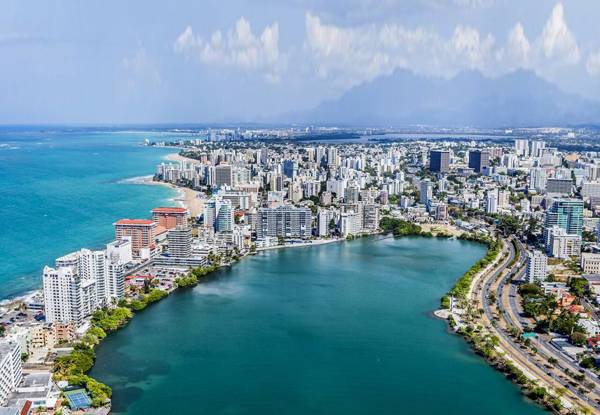A Guide to Puerto Rico Export Services Tax Incentive – For Businesses
- Posted: May 15, 2018
- Posted by: Travis Lynk
- Last Reviewed: November 30, 2022

A Guide to Puerto Rico Export Services Tax Incentive – For Businesses
On January 17, 2012, Puerto Rico enacted Act 20, known as the “Export Services Act”. This Act was designed to help accelerate the economic recovery of Puerto Rico by attracting new businesses and employment opportunities to Puerto Rico. Service businesses ranging from advertising to accounting to legal services, as well as hedge funds and a wide range of other consulting firms are eligible for the benefits.
In short, Act 20 provided a 4% corporate tax rate to businesses operating inside Puerto Rico, that receive income from customers located outside of Puerto Rico. This means a business needs to be able to remotely provide its services. This is all possible because the Federal Government does not tax Puerto Rico residents, instead leaving that responsibility to the Puerto Rican government.
As of January 1, 2020, Act 20 has been replaced by Act 60, which brings with it some changes to the requirements. In this guide, we outline the changes Act 60 has made to Act 20.
There is a separate act for individuals called Act 22, which Act 60 has also replaced (see our guide).
What are the tax benefits for Act 60 Puerto Rico?
Eligible businesses with operations inside Puerto Rico receive the following benefits for income derived from customers outside of Puerto Rico:
- 4% corporate tax rate
- 100% tax exemption on distributions from earnings and profits
- 50% tax exemption on municipal taxes
- 75% tax exemption on municipal and state property taxes (small and medium businesses can receive a 100% exemption during their first five years of operation)
A few points of clarification:
- “Operations inside Puerto Rico” is defined as work output or value created on Puerto Rico soil, whether that is by the business owner or employees.
- The business owner and employees must receive a reasonable salary based on the services provided, which is taxed at ordinary Puerto Rico income tax rates (as high as 33%). This means you can’t pass through 100% of net revenue at the 4% corporate tax rate.
Also note that under Act 60, the Office of Industrial Tax Exemption (OITE) will now execute independent audits of Act 60 businesses at least once every two years. As of yet, it is unclear whether these audits also apply to businesses that filed for Act 20 before Act 60 went into effect.
Which types of business are eligible for Act 60?
- Research and development
- Advertising and public relations
- Consulting services, including, but not limited to, economic, scientific, environmental, technological, managerial, marketing, human resources, computer, and auditing consulting services
- Advice services on matters related to any trade or business
- Creative industries
- Production of blueprints, engineering, and architectural services, and project management
- Professional services such as legal, tax, and accounting services
- Centralized managerial services, including, but not limited to, strategic direction, planning, and budgeting, provided by regional headquarters or a company engaged in the business of providing such services
- Electronic data processing centers
- Development of licensable computer software
- Telecommunications voice and data between persons located outside of Puerto Rico
- Call centers
- Shared service centers
- Storage and distribution centers
- Educational and training services
- Hospital and laboratories services, including telemedicine facilities and medical tourism services
- Investment banking and other financial services, including, but not limited to, asset management, management of investment alternatives, management of activities related to private capital investment, management of coverage funds or high-risk funds, management of pools of capital, trust management that serves to convert different groups of assets into securities, and escrow account management services
- Commercial and mercantile distribution of products manufactured in Puerto Rico for jurisdictions outside Puerto Rico
- Assembly, bottling, and packaging operations of products for export
- Trading companies
- Blockchain-related services
The eligible business must not have a nexus with Puerto Rico. In other words, the service must not be related to the conduct of a trade, business, or other activity in Puerto Rico to qualify for the benefits of the Act. In general, this means the clients of the business need to be outside of Puerto Rico. The following services are considered to have a nexus with Puerto Rico, and are be eligible services:
- Business or income-producing activities that are or have been performed in Puerto Rico by the applying business
- The sale of any property for the use, consumption, or disposition in Puerto Rico
- Counseling on the laws, regulations, and administrative determinations of the government of Puerto Rico and its instrumentalities
- Lobbying on the laws, regulations, and administrative determinations of the government of Puerto Rico and its instrumentalities
- Any other activity designated by the Secretary of the Department of Economic Development and Commerce of Puerto Rico
In order to be eligible, businesses that generate an annual business volume of at least $3,000,000 must also directly employ at least one full-time employee. The employee must be a Puerto Rican resident and directly participate in the business activities pertinent to the decree.
Is your business required to move to Puerto Rico?
Yes, the work needs to be performed in Puerto Rico to benefit from the tax advantages. There are two primary structures to accomplish this:
- Act 60 businesses moving 100% of their income producing activities to Puerto Rico. In this scenario, you would set up a new entity in Puerto Rico, and then all value-producing employees would relocate to Puerto Rico (or be replaced). The US business would then cease operations, and 100% of income would now be taxed from within Puerto Rico under Act 60.
- Act 60 businesses moving a portion of their income producing activities to Puerto Rico. In this scenario, you would set up a new entity in Puerto Rico and then from that entity charge a “management fee” to your existing domestic eligible business. You would need a transfer pricing analysis and intercompany agreements to establish how much of your revenue you can appropriate to Puerto Rico resources vs. the existing US resources. This is required because the Puerto Rican company is a non-US entity under US tax law, and tax jurisdictions want to maximize their keep of tax revenues. For more on transfer pricing, which determines where and how much of the “value creation” takes place, see our guide.
How do you get the tax exemption decree?
Your business needs to submit an application to the Office of Industrial Tax Exemption (OITE) of Puerto Rico to obtain a tax exemption decree, which provides the full details of the tax rates and conditions mandated by the Act and is considered a contract between the government of Puerto Rico and the business. Once the service provider obtains the tax exemption decree, the benefits granted are secured during the term of the decree, irrespective of any changes in the applicable Puerto Rico tax laws. The decree is initially valid for 15 years and can be extended for an additional 15 years.
How much does Act 60 cost?
- Application fee: $1,005
- Sworn statement fees $315
- Annual compliance filing: $505
###
Contact us to save time, money, and headaches related to your Act 60 application – you’ll thank us later.
Resource: Guide: Puerto Rico Tax Incentives Act 60
Resource: Incentives Code – Changes to Act 20 & Act 22
Disclaimer: Neither PRelocate, LLC, nor any of its affiliates (together “PRelocate”) are law firms, and this is not legal advice. You should use common sense and rely on your own legal counsel for a formal legal opinion on Puerto Rico’s tax incentives, maintaining bona fide residence in Puerto Rico, and any other issues related to taxes or residency in Puerto Rico. PRelocate does not assume any responsibility for the contents of, or the consequences of using, any version of any real estate or other document templates or any spreadsheets found on our website (together, the “Materials”). Before using any Materials, you should consult with legal counsel licensed to practice in the relevant jurisdiction.
More Articles
-
The New York Times Names Puerto Rico the #1 Place to Go in 2019

Read MoreFebruary 18, 2019 -
How to Protect Your Home in Puerto Rico When You’re Away

Read MoreFebruary 12, 2020



